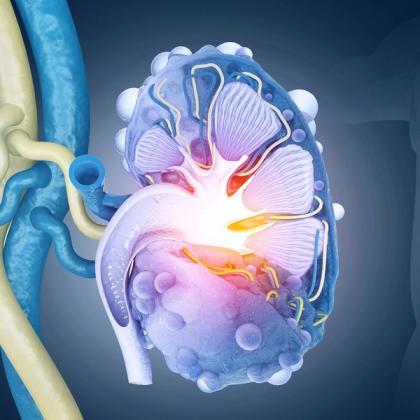Ep 165 – Chronic kidney disease among adults in primary care: management

Posted 17 Jul 2025
Dr Hannah Rosa, Dr Will Hinchliffe
In the second part of a two-episode series on chronic kidney disease (CKD), Dr Hannah Rosa is joined again by Dr Will Hinchliffe, a Consultant in Renal and General Medicine working in the North East and North Cumbria. They discuss the management options for CKD that can be initiated in primary care. They first look at how to empower patients with lifestyle and dietary advice, then the medical treatment options we have for CKD and when to start them, before finishing with holistic care, especially with regards to cardiovascular disease. This episode is mainly based on the NICE assessment and management guideline for CKD, but it also draws on other recent guidelines from Kidney Disease Improving Global Outcomes (KDIGO) and the International Society of Nephrology as it aims to help you to improve the lives of your patients with CKD.
Key take-home points
Lifestyle and dietary advice
- We can empower patients to improve the health of their kidneys through:
- Providing good patient information
- Promoting exercise
- Encouraging weight loss if needed and a healthy balanced diet – including advice on salt restriction, ideally less than 5 g of sodium chloride per day
- Advising that alcohol should be kept to a minimum
- Giving smoking cessation advice.
- With regards to medication, patients should know to try to avoid non-steroidal anti-inflammatory drugs and we should consider H2-receptor antagonists rather than proton pump inhibitors if gastric protection is required.
Medical treatments
- Renin–angiotensin–aldosterone system inhibitors (RAASis) include angiotensin-converting enzyme inhibitors (ACEis) and angiotensin receptor blockers (ARBs):
- First-line treatment option for hypertension if a patient has type 2 diabetes (T2D) or if they are aged under 55 and not of black African or African-Caribbean family origin.
- Initiated in CKD if:
- Urine albumin:creatinine ratio (ACR) is ≥3 mg/mmol in a patient with diabetes
- Urine ACR is ≥30 mg/mmol in a patient with hypertension
- Urine ACR is ≥70 mg/mmol.
- Potassium, estimated glomerular filtration rate (eGFR) and blood pressure should be checked before starting a RAASi, then within 4 weeks of starting and then ideally after each dose increase.
- If creatinine increases by less than 50% from baseline, as long as eGFR remains ≥20 mL/min/1.73m2, the patient is well and their potassium is ≤5.5, then this is acceptable and no RAASi change is needed as long as the renal function stabilises.
- Sodium–glucose co-transporter-2 inhibitors:
- Note: NICE guidance on dapagliflozin for the treatment of CKD has been updated since this episode was recorded; current recommendations are now the same as those for empagliflozin (see below).
- Dapagliflozin and empagliflozin are recommended by NICE as options for add-on therapy to an ACEi or ARB if:
- eGFR is 20–44 mL/min/1.73 m2, or
- eGFR is 45–90 mL/min/1.73 m2 and there is either an ACR ≥22.6 mg/mmol or T2D.
- These drugs are contraindicated in type 1 diabetes.
- Finerenone, a non-steroidal mineralocorticoid receptor antagonist:
- Recommended by NICE as a treatment option for people with stage 3 or 4 CKD associated with T2D if ACR is still ≥3 mg/mmol, if used as an add-on to optimised standard care and if eGFR is ≥25 mL/min/1.73 m2. Serum potassium must also be ≤5 mmol/L.
- Glucagon-like peptide-1 (GLP-1) receptor agonists, such as semaglutide:
- Note: in the UK, GLP-1 receptor agonists are not currently licensed for the treatment of CKD.
- For use in people with T2D. These drugs can be considered especially if HbA1c is above target or weight loss is recommended.
- When starting any of these medications, patients should be educated on the sick day rules and know that they may all need to be stopped if they are at risk of dehydration.
- Medications discussed within the podcast reduce the rate of potential decline in kidney function rather than improve kidney function.
Holistic care
- All patients with CKD should be offered atorvastatin 20 mg for primary and secondary prevention of cardiovascular disease.
- For primary prevention the aim is for ≥40% reduction in non-HDL cholesterol.
- For secondary prevention the aim is for LDL-cholesterol ≤2 mmol/L or non-HDL cholesterol ≤2.6 mmol/L.
- If the statin dose needs to be increased, renal advice should be sought if eGFR ≤30 mL/min/1.73 m2.
- Aspirin should be prescribed only for the secondary prevention of cardiovascular disease in people with CKD.
- Monitor the different risk factors that accompany CKD:
- Blood tests including full blood count for anaemia, lipids, HbA1c and liver function tests
- Weight
- Heart rate and rhythm and blood pressure.
- The NHS advises that people with CKD should also have vaccinations for pneumococcal disease, flu and hepatitis B.
Key references
- NICE. 2021. https://www.nice.org.uk/guidance/ng203.
- Medscape UK. 2025. https://www.kidneyresearchuk.org/wp-content/uploads/2023/03/CKD_Hack_Feb_2025_v7_1_Interventions.pdf.
- Kim SG, et al. BMJ Open. 2024;14:e078032. doi: 10.1136/bmjopen-2023-078032.
- NICE. 2023. https://www.nice.org.uk/guidance/ng136.
- KDIGO. 2024. https://kdigo.org/wp-content/uploads/2024/03/KDIGO-2024-CKD-Guideline.pdf.
- ISN. https://www.theisn.org/wp-content/uploads/2023/11/RAASi-eGFR_English.pdf.
- NICE. 2022. https://www.nice.org.uk/guidance/ta775.
- NICE. 2023. https://www.nice.org.uk/guidance/ta942.
- NICE. 2023. https://www.nice.org.uk/guidance/ta877.
- NICE. 2023. https://www.nice.org.uk/guidance/ng238.
- NHS. 2023. https://www.nhs.uk/vaccinations/nhs-vaccinations-and-when-to-have-them/.
- NICE. 2025. http://nice.org.uk/guidance/ta1075.
Resources
- Kidney Care UK. 2024. https://kcuk.cdn.ngo/media/documents/Kidney_Care_UK_Chronic_Kidney_Disease.pdf
- Medscape UK. 2025. https://www.kidneyresearchuk.org/wp-content/uploads/2023/03/CKD_Hack_Feb_2025_v7_1_Interventions.pdf
- Down S. 2020. https://www.gpni.co.uk/wp-content/uploads/2020/06/how-to-advise-on-sick-day-rules.pdf
Create an account to add page annotations
Annotations allow you to add information to this page that would be handy to have on hand during a consultation. E.g. a website or number. This information will always show when you visit this page.